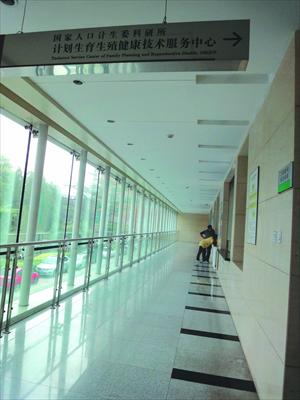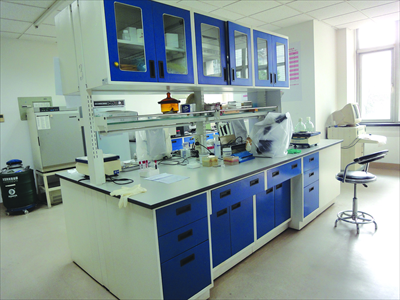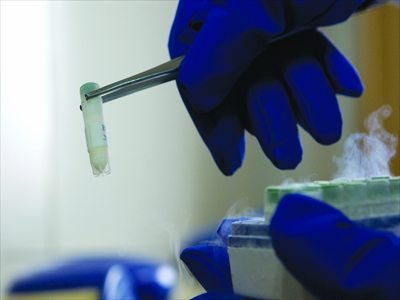HOME >> METRO BEIJING
Sperm shortage
By Li Lin Source:Global Times Published: 2013-9-17 18:28:01

A couple at the Technical Service Center of Family Planning and Reproductive Health. Photo: Li Lin/ GT
The Beijing Human Sperm Bank wants you to help give the gift of life. That is, if you are one of the 20 percent of candidates whose semen contains a high enough concentration of sperm to qualify."Young men, compared with the waste of masturbation, why don't you try to donate your essence to us?" urges Chen Zhenwen, director of the sperm bank. "Our biggest difficulty is recruiting sperm donors."
The first sperm bank in China was founded in 1988 in Hunan Medical University. Now there are 15. The Beijing Human Sperm Bank was founded in 2005. With the increasing openness of Chinese society, sperm donation is no longer a new concept to Chinese people, but recruiting donors is still not easy.
Compared with blood, marrow and organ donation, sperm donation is painless, costless, and does not carry the risk of surgery, Chen points out.
From the official blog of the Beijing Human Sperm Bank, people who are dubious about sperm donation can ease their worries by learning about the process online. The donors receive a free health examination including blood test, HIV and sexually transmitted disease test and genetic disease test. In addition, the donors take a sperm quality test.
Tough criteria
According to Chen, only about 20 percent of the donors can pass the strict examination and have a chance to donate their sperm. "The sperm concentration of ordinary men is 15 million per milliliter, and our standard for sperm for frozen storage is 56 million to 60 million per milliliter. So we are sorry that most of the volunteers cannot pass the examination. Not because their sperm is unqualified, but our standard is very high." As a result, fewer people go to the sperm bank. However, in China the examination process is not as strict as in most Western countries, where the donors are required to have genetic tests and a mental health test, and only 5 percent of applicants qualify, he says.
An online survey on the Beijing Human Sperm Bank's blog gives the reasons why men are not willing to donate their sperm. Among 530 respondents, 212 think the procedures for sperm donation are too complicated and donation is too much trouble; 191 don't understand what's involved; 157 think the money is not worth it; 148 are worried about their privacy; 98 think the opening hours and location of the sperm bank are not convenient; and 85 are too shy and afraid of being caught by their family and friends. Other concerns include reluctance to have a child, anxiety about the trouble a child could bring, distrust of the sperm bank, and concerns about their health.
"I can donate my blood, and I have donated several times, but it is too weird to donate my sperm," said Wang Xu, a 26-year-old office clerk in an advertising company, when asked about donating sperm. "I can't imagine what that is like. How could anyone do that in front of strangers? Besides, if I am qualified to offer sperm, that means I'm going to be someone's father in the future! Who knows whether the kid would come to me and ruin my life?" Many people share his fears.

The Beijing Human Sperm Bank lab. Photo: Li Lin/GT
High demandOften, couples can't have children because of male infertility, and the demand for sperm far outstrips the supply from healthy donors, according to Huang Jun, director of the Assisted Reproduction Department of the Technical Service Center of Family Planning and Reproductive Health. Huang said patients from all over the country come to Beijing to ask for help. One reason is that there are no sperm banks in remote areas such as Tibet Autonomous Region and Ningxia Hui Autonomous Region. Another reason is that people tend to believe donors from Beijing are better educated, and thus of higher genetic quality.
"Having a child is a big event, especially for couples suffering from infertility," said Chen. "Patients can be very picky in choosing sperm. They want the donor to be well educated, good looking, and not too short. And the most important point is that their child should look like its legal father. For example, if the father is 180 cm tall, they would not agree to accept the sperm of a man who is only 160 cm tall."
According to Chen, each patient has particular demands, and some picky patients cannot find a suitable donor from the entire sperm bank. As a result, Chen thinks that the donors must come in different shapes and sizes to suit different demands of the patients.
Some men, noting the high demand for sperm donors, are offering to help out women seeking to have a child for no cost.
A 30-year-old man surnamed Liu who offers his sperm to women on an online QQ group says, "Ever since the day I entered the group and sent my personal data online, there have been quite a few women coming to me for help."
Liu told Metropolitan that he donated sperm to Beijing's sperm bank in 2010, and received more than 4,000 yuan ($650). After that, he donated to two other women through underground channels. When asked why he is so passionate about sperm donation, he explained he wanted to fill the gap between sperm supply and demand. However, one man can only donate to the sperm bank once in his life. "I think I should donate more. China has a huge population, so I do not worry about the trouble the children may bring me. We'll never meet." Liu is not alone. There are numerous passionate donors online who are willing to help women with reproduction. "I don't know other people's purpose and their health conditions," says Liu. "But I am a perfect choice."

Storing a test tube of frozen semen. Photo:CFP
Desperate situationLiu's opinions and behavior may seem dubious, but for some women who have repeatedly tried in vitro fertilization and failed, a donation from a stranger may seem like a good option. All 30-year-old Mira and her husband want is a healthy baby. But her husband is suffering from obstructive azoospermia - he has sperm but they cannot enter his semen. Mira said that she has been attempting in vitro fertilization for three years. Doctors collect her husband's sperm from his testicles using a needle. She says the procedure has always failed because of the low quality and quantity of her husband's sperm. Mira said that they have applied to the sperm bank twice, but were refused, because her husband still has live sperm. Mira says she is on the edge of desperation.
"In vitro fertilization is undermining my health with constant hormone therapy to stimulate ovulation, and the repeated failure is going through our savings. So I am thinking about underground sperm donation. I know it is unsafe, but I really have no choice," said Mira.
Chen warns that any kind of underground sperm donation or trading is illegal.
"You will never know whether the donor has diseases, especially genetic ones which cannot be found through a normal physical examination. Besides, the illegal behavior has crossed the moral bottom line, and may lead to other crimes. I hope that patients can all keep rational and stay aware enough to protect themselves."
Chen also says that the laws and regulations still need to be improved to support legal sperm donation and crack down on illegal behavior.
Peer pressure
The legal market for sperm donors tends to draw a wave of students at the beginning of each semester, says Chen.
A student surnamed Xuan, who visited the sperm bank alone on September 12, told Metropolitan, "I saw the recruiting information over my mobile phone, and I decided to come here, not only for money, but also to contribute to the public welfare." Xuan says that although his fellow students at the Beijing University of Chemical Technology make jokes about sperm donation, they may come to the clinic and donate as well.
This is the result of peer education, says Chen. One student from a certain university comes, and a few days later, several other students from the same university follow. When the sperm bank was first established, Chen used to go to universities and large enterprises in Beijing to advertise. In Chen's opinion, the most enlightened and open-minded people in China are gathering in universities, so he focuses on them now. According to the sperm bank staff, there will be a tide of college student donors every year when new school terms begin, and the number of donors is becoming larger and larger.
No path to riches
Chen says he is happy to see that there are many people in Beijing who do not care about personal gain or loss, and donate in order to help others. "Last year, a man who transferred his job to Shanghai flew back all the way to Beijing to accept the final reexamination. He not only traveled at his own expense, but also politely refused the 4,000 yuan subsidy for his contribution."
Although there are many unselfish donors who don't care about the money, there are also many coming for money. Most are university students. Chen said the sperm bank has increased its donation subsidy, which may encourage more young men to come.
Considering the amount of sperm a normal man produces, receiving several thousand yuan per donation seems like a path to riches. This idea has spread over the Internet, inspiring some people who hope to masturbate their way to home ownership amid Beijng's prohibitively expensive real estate market.
Chen notes, "We welcome public-spirited gentlemen. I have to dispel the rumor on the Internet saying the subsidy for sperm donation can be accumulated to buy a home in Beijing. One person can only donate once in one institution, although the donors have to come to us for over 10 times during the whole donation process. So it is ridiculous to say one's sperm can help him buy a house."
Posted in: Metro Beijing